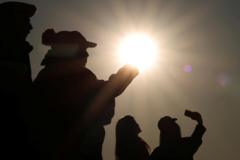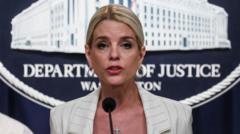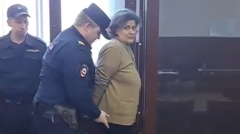The case highlights the clash between governmental fears of espionage and the free speech rights of TikTok's 170 million American users.
**TikTok Makes Final Stand Against U.S. Ban at Supreme Court**

**TikTok Makes Final Stand Against U.S. Ban at Supreme Court**
TikTok appeals to the Supreme Court to overturn a U.S. ban amid concerns about national security and free speech.
In a pivotal moment for the popular social media platform, TikTok is set to make its final arguments before the U.S. Supreme Court this Friday, challenging a controversial ban that could force its separation from its Chinese parent company by January 19. The case probes the intricate balance between national security concerns and the constitutional protections of free speech.
The U.S. government contends that without a divestiture, TikTok poses a significant risk of being utilized by China for surveillance and political manipulation. TikTok, however, staunchly defends itself against these claims, emphasizing it has been unjustly targeted. The company argues that the law violates the First Amendment rights of its 170 million U.S. users.
Despite lower courts supporting the government's position, the case became more nuanced when President-elect Donald Trump intervened, calling for a delay in the law's enforcement to facilitate a potential resolution. Legal experts remain uncertain about the Supreme Court’s ruling; they note that cases weighing government interests against constitutional values are often resolved in favor of the government.
The law in contention was enacted with bipartisan support in Congress, reflecting longstanding worries about TikTok's ties to China. According to the legislation, while individual use of the app remains permitted, tech giants like Apple and Google would be mandated to stop providing access, essentially leading to its demise over time. Other nations, such as India and the UK, have already imposed similar bans on the platform.
The Trump administration labeled TikTok a “grave” threat, claiming that the Chinese government could compel ByteDance, its owner, to relinquish user data or skew content to serve Chinese agendas. An appeals court previously upheld the law, citing China's track record of leveraging private companies for governmental purposes, reinforcing the necessity of the measure as part of a broader national security strategy.
Throughout the legal battles, TikTok has continuously rejected any supposed influence from the Chinese Communist Party and asserts that the law's foundation is built on "inaccurate, flawed, and hypothetical information." They urge the Supreme Court to deem the law unconstitutional or to pause its execution for a more thorough review.
Adding complexity to the landscape are individual legal actions taken by TikTok users, who claim the potential ban would severely infringe upon their freedom of expression. Advocacy groups, including the American Civil Liberties Union, argue that the government has not provided substantial evidence of any direct harm attributable to the platform.
The legal discourse also reflects discord among political figures. Trump's statement regarding the need for political negotiation sharply contrasts his secretary of state nominee’s stance, who supports the ban. Analysts speculate that even with Trump's intervention, significant resolution regarding national security concerns remains elusive.
As the Supreme Court prepares to deliver its ruling, the future of TikTok hangs in the balance, drawing intense scrutiny from users and stakeholders, all while the backdrop of a broader debate on free speech versus national security continues to unfold.
The U.S. government contends that without a divestiture, TikTok poses a significant risk of being utilized by China for surveillance and political manipulation. TikTok, however, staunchly defends itself against these claims, emphasizing it has been unjustly targeted. The company argues that the law violates the First Amendment rights of its 170 million U.S. users.
Despite lower courts supporting the government's position, the case became more nuanced when President-elect Donald Trump intervened, calling for a delay in the law's enforcement to facilitate a potential resolution. Legal experts remain uncertain about the Supreme Court’s ruling; they note that cases weighing government interests against constitutional values are often resolved in favor of the government.
The law in contention was enacted with bipartisan support in Congress, reflecting longstanding worries about TikTok's ties to China. According to the legislation, while individual use of the app remains permitted, tech giants like Apple and Google would be mandated to stop providing access, essentially leading to its demise over time. Other nations, such as India and the UK, have already imposed similar bans on the platform.
The Trump administration labeled TikTok a “grave” threat, claiming that the Chinese government could compel ByteDance, its owner, to relinquish user data or skew content to serve Chinese agendas. An appeals court previously upheld the law, citing China's track record of leveraging private companies for governmental purposes, reinforcing the necessity of the measure as part of a broader national security strategy.
Throughout the legal battles, TikTok has continuously rejected any supposed influence from the Chinese Communist Party and asserts that the law's foundation is built on "inaccurate, flawed, and hypothetical information." They urge the Supreme Court to deem the law unconstitutional or to pause its execution for a more thorough review.
Adding complexity to the landscape are individual legal actions taken by TikTok users, who claim the potential ban would severely infringe upon their freedom of expression. Advocacy groups, including the American Civil Liberties Union, argue that the government has not provided substantial evidence of any direct harm attributable to the platform.
The legal discourse also reflects discord among political figures. Trump's statement regarding the need for political negotiation sharply contrasts his secretary of state nominee’s stance, who supports the ban. Analysts speculate that even with Trump's intervention, significant resolution regarding national security concerns remains elusive.
As the Supreme Court prepares to deliver its ruling, the future of TikTok hangs in the balance, drawing intense scrutiny from users and stakeholders, all while the backdrop of a broader debate on free speech versus national security continues to unfold.




















